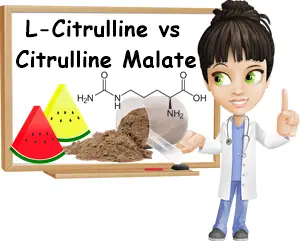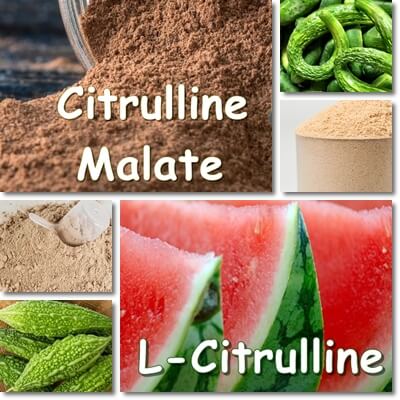Citrulline is an amino acid with scientifically proven benefits for blood pressure control, muscle maintenance and exercise performance and endurance. It is available as a dietary supplement, as powder or pills, in two formulations: L-citrulline and citrulline malate. The main difference between the two is that L-citrulline is pure citrulline, whereas citrulline malate is citrulline together with a salt of malic acid called malate. There are real, research-based benefits associated with both L-citrulline supplementation and citrulline malate supplementation for blood pressure, blood circulation, exercise performance and endurance and even muscle growth for bodybuilding.
What is citrulline?
Citrulline is an amino acid that is normally produced in the human body, but is also present in food. When citrulline isn’t produced in sufficient amounts, or at all, or demands are higher than usual, the body meets its requirements from dietary sources. Yellow watermelon, orange watermelon, pink and red watermelon, the white part of watermelon and watermelon rind, but also cucumbers, bitter melon, zucchini, marrow and pumpkin naturally contain citrulline. Citrulline is classified as a non-essential amino acid, that is, it is not needed from the diet because it is produced by the body. However, in instances of increased demands, citrulline becomes (conditionally) essential and needs to be supplied from the diet.

Types of citrulline
There are several different types of citrulline according to source and purity:
- Citrulline from natural sources (watermelon, watermelon rind, cucumber, bitter melon, pumpkin, gourds and even onions and garlic) vs citrulline from dietary supplements, powder or pills, typically manufactured via fermentation.
- Citrulline from dietary supplements is available as pure citrulline (citrulline, l-citrulline or L-citrulline) and citrulline malate (a formulation of citrulline and malate, a salt of malic acid), powder or pills.
Citrulline vs L-citrulline vs Citrulline malate
What is the difference between citrulline, L-citrulline and citrulline malate? Citrulline is the common name for the amino acid and refers to the pure form, whether from food sources or dietary supplements. The name is also used to refer to the amino acid produced naturally in the human body. L-citrulline is usually how the amino acid in dietary supplements is referred to. L-citrulline in dietary supplements can be extracted from the foods in which it occurs naturally or synthesized through fermentation, for example.
The name L-citrulline also refers to pure citrulline, without any additions.
But there is a difference between citrulline and L-citrulline, and citrulline malate. Whereas citrulline and L-citrulline refer to the amino acid in pure form, citrulline malate is not pure citrulline. As its name indicates, it is citrulline together with malate which is a salt of malic acid. Malic acid is a perfectly natural chemical, an organic acid that gives some fruits their sour taste (e.g. apples and sour apples, but also rhubarb, plums, mirabelle plums or mirabelles and unripe fruits in general).
The names malic acid and malate come from the Latin word for apple, ‘malum’, and the Latin scientific name for the fruit species, ‘Malus domestica’. Versus citrulline and L-citrulline which are pure forms of the amino acid, citrulline malate is not pure citrulline, but a combination of citrulline and malate, a salt of an organic acid.

L-citrulline vs Citrulline Malate
What is the difference between L-citrulline and citrulline malate? L-citrulline and citrulline malate are two different types of citrulline dietary supplements. L-citrulline is 100% pure citrulline vs citrulline malate which is citrulline together with malate (a salt of malic acid). Citrulline malate is typically formulated in a 1:1 ratio, half citrulline and half malate. However, citrulline malate can also be formulated in a 1:2 ratio, meaning double the amount of malate compared to citrulline. So L-citrulline supplements contain more of the active ingredient compared to citrulline malate supplements.
Is citrulline malate better than citrulline?
Which is better: citrulline or citrulline malate? Opinions on the topic are divided. Some people prefer pure citrulline supplements, that is, L-citrulline, because these provide 100% of the active ingredient they are looking to supplement with. Others prefer citrulline malate supplements because the malate in the formulation is purported to enhance the biological effects of citrulline. However, research on the benefits of citrulline for health is poor as it is, and research on citrulline malate being a better formulation than citrulline is even poorer.
There is a study that says that citrulline malate enhances athletic anaerobic performance and relieves muscle soreness after a workout. Another study says that one-time pre-workout supplementation with citrulline malate does not improve post exercise muscle recovery. However, supplementation with citrate malate in women has been shown to improve exercise performance (source) and maximal strength and anaerobic power in female tennis players (source).
At this point it can’t be said with certainty that citrulline malate is better than pure citrulline, or vice-versa. Both forms appear to hold benefits for various aspects of health, including benefits for blood pressure, blood circulation, high heart rate, ed, exercise performance, muscle function and possibly also muscle growth and maintenance for bodybuilding.
What are the benefits?
Whether its pure citrulline, or L-citrulline, or citrulline malate, here is a list of science-backed benefits associated with consumption of the amino acid supplement:
- Helps lower high blood pressure (see the benefits of citrulline for blood pressure)
- Vasodilating properties with benefits for good blood flow
- Vasoprotective properties for good cardiovascular health
- Benefits for high heart rate
- Supports higher blood flow to muscles, with benefits for exercise endurance and exercise performance
- Potential benefits for muscle maintenance and possibly also muscle growth for bodybuilding
- Workout booster with benefits for muscle fatigue (delaying muscle fatigue)
- Benefits for ED as a result of improved blood flow and a vasoprotective action
- Benefits for the immune system function
- Therapeutic benefits for sickle cell anemia (source)
- Antioxidant properties, with benefits for free radical cell damage
- Boosts arginine production and improves arginine levels
